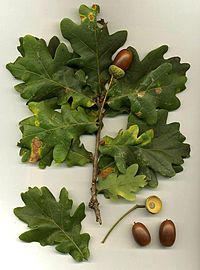
Influence of macroclimate and local conservation measures on taxonomic, functional, and phylogenetic diversities of saproxylic beetles and wood-inhabiting fungi
Sign Up to like & getrecommendations! Published in 2018 at "Biodiversity and Conservation"
DOI: 10.1007/s10531-018-1592-0
Abstract: Wood-inhabiting fungi and saproxylic beetles are threatened by habitat degradation. Our understanding of the importance of macroclimate and local factors determining their taxonomic diversity has increased, but determinants of functional and phylogenetic diversity are poorly… read more here.
Keywords: functional phylogenetic; saproxylic beetles; diversity; phylogenetic diversities ... See more keywords

Detailed information on fruiting phenology provides new insights on wood-inhabiting fungal detection
Sign Up to like & getrecommendations! Published in 2017 at "Fungal Ecology"
DOI: 10.1016/j.funeco.2016.06.007
Abstract: Abstract Fruiting phenology traits may have a large effect on the detection of fungal species. Detailed studies considering these biologically important traits are, however, surprisingly scarce. We conducted a rigorous fruit body monitoring of wood-inhabiting… read more here.
Keywords: fruiting phenology; detection; inhabiting fungal; wood inhabiting ... See more keywords

Skeletocutins A-L: Antibacterial Agents from the Kenyan Wood-inhabiting Basidiomycete, Skeletocutis sp.
Sign Up to like & getrecommendations! Published in 2019 at "Journal of agricultural and food chemistry"
DOI: 10.1021/acs.jafc.9b02598
Abstract: Fermentation of the fungal strain Skeletocutis sp. originating from Mount Elgon Natural Reserve in Kenya, followed by bioassay guided fractionation led to the isolation of twelve previously undescribed metabolites named skeletocutins A-L (1-5, 7-13) together… read more here.
Keywords: kenyan wood; skeletocutins antibacterial; antibacterial agents; skeletocutis ... See more keywords

Measuring and predicting the influence of traits on the assembly processes of wood‐inhabiting fungi
Sign Up to like & getrecommendations! Published in 2017 at "Journal of Ecology"
DOI: 10.1111/1365-2745.12722
Abstract: Summary The identification of traits that influence the responses of the species to environmental variation provides a mechanistic perspective on the assembly processes of ecological communities. While much research linking functional ecology with assembly processes… read more here.
Keywords: assembly processes; inhabiting fungi; influence; wood inhabiting ... See more keywords

Biological traits explain bryophyte species distributions and responses to forest fragmentation and climatic variation
Sign Up to like & getrecommendations! Published in 2018 at "Journal of Ecology"
DOI: 10.1111/1365-2745.12930
Abstract: Forest ecosystems have been subjected to intensive exploitation, and on top of these land use-driven habitat alterations, there is an ongoing and rapid climate change. Understanding why environmental responses differ across species and how differences… read more here.
Keywords: variation; bryophyte species; inhabiting bryophytes; dead wood ... See more keywords

Wood-inhabiting macrofungi Hymenochaetales and Polyporales (Basidiomycota) in the Amazon Forest: relationship the abiotic factors and substrate colonization.
Sign Up to like & getrecommendations! Published in 2022 at "Anais da Academia Brasileira de Ciencias"
DOI: 10.1590/0001-3765202220210554
Abstract: Hymenochaetales and Polyporales are important macrofungi for the maintenance of tropical forests, since they act directly in the nutrient cycling of the wood decomposition. In the Amazon, the largest tropical forest in the world, knowledge… read more here.
Keywords: hymenochaetales polyporales; macrofungi hymenochaetales; polyporales basidiomycota; wood inhabiting ... See more keywords

Species Diversity With Comprehensive Annotations of Wood-Inhabiting Poroid and Corticioid Fungi in Uzbekistan
Sign Up to like & getrecommendations! Published in 2020 at "Frontiers in Microbiology"
DOI: 10.3389/fmicb.2020.598321
Abstract: Uzbekistan, located in Central Asia, harbors high diversity of woody plants. Diversity of wood-inhabiting fungi in the country, however, remained poorly known. This study summarizes the wood-inhabiting basidiomycte fungi (poroid and corticoid fungi plus similar… read more here.
Keywords: diversity; inhabiting poroid; fungi uzbekistan; wood inhabiting ... See more keywords

Phylogenetic and Taxonomic Analyses of Three New Wood-Inhabiting Fungi of Xylodon (Basidiomycota) in a Forest Ecological System
Sign Up to like & getrecommendations! Published in 2022 at "Journal of Fungi"
DOI: 10.3390/jof8040405
Abstract: Wood-inhabiting fungi are a cosmopolitan group and show a rich diversity, growing in the vegetation of boreal, temperate, subtropical, and tropical regions. Xylodon grandineus, X. punctus, and X. wenshanensis spp. nov. were found in the… read more here.
Keywords: phylogenetic taxonomic; taxonomic analyses; wood inhabiting; xylodon ... See more keywords

Ceriporiopsis tianshanensis (Polyporales, Agaricomycetes) and Sidera tianshanensis (Hymenochaetales, Agaricomycetes), two new species of wood-inhabiting fungi from Xinjiang, Northwest China
Sign Up to like & getrecommendations! Published in 2023 at "MycoKeys"
DOI: 10.3897/mycokeys.98.102552
Abstract: Wood-inhabiting fungi are abundant in China, but their distribution is uneven, with more fungi in southwest China and fewer fungi in northwest China. During the investigation of wood-inhabiting fungi in Xinjiang, we collected a large… read more here.
Keywords: northwest china; wood inhabiting; tianshanensis; inhabiting fungi ... See more keywords